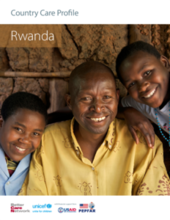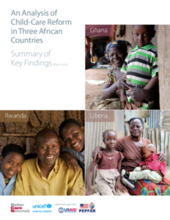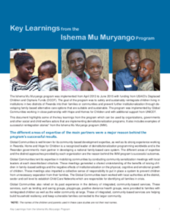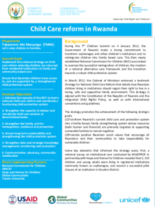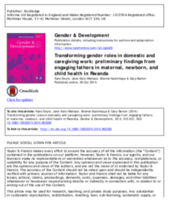This country page features an interactive, icon-based data dashboard providing a national-level overview of the status of children’s care and care reform efforts (a “Country Care Snapshot”), along with a list of resources and organizations in the country.
demographic_data
childrens_living_arrangement
children_living_without_bio
adoption
social_work_force
key_stakeholders
Key Stakeholders
Add New DataOther Relevant Reforms
Add New Datadrivers_of_institutionalisation
Drivers of Institutionaliziation
Add New Datakey_research_and_information
Key Data Sources
Add New DataReport on National Assessment of Centres caring for Children with Disabilities in Rwanda
National Integrated Child Rights Policy
Country Care Review: Rwanda
Prevalence and number of children living in institutional care: global, regional, and country estimates
The Way Forward Project Report
Community-Based Child Protection Mechanisms in Refugee Camps in Rwanda: An Ethnographic Study
Displaying 131 - 140 of 188
This country care profile provides an overview of key lessons learned in the children’s care reform process in Rwanda, including successes, challenges and areas for progress, and gaps in learning and best practice.
This report summarizes the care-reform process of three sub-Saharan African countries – Ghana, Liberia and Rwanda.
This study intended to develop data regarding how families parent and nurture good behaviour in their children; whether they know what would constitute nonviolent (positive) discipline; and if they actually utilized the positive aspects of disciplining. The study was conducted in specific areas (study clusters) in Kenya, Uganda, Ethiopia and Rwanda.
This document highlights some of the key learnings from the Ishema Mu Muryango program, a program designed to safely and sustainably reintegrate children living in institutions in two districts of Rwanda into their families or communities and prevent further institutionalization.
This overview document provides a brief update on child care reform in Rwanda.
This working paper, produced by the Better Care Network and the Global Social Service Workforce Alliance, explores the topic of social service workforce strengthening as it relates to child care reform.
As part of the work of the BCN Eastern and Southern Africa Regional Initiative, the National Commission for Children in partnership with BCN, and Save the Children convened a national consultative workshop in Kigali, Rwanda on 26 and 27 November 2014. This report presents a summary of the main priority outcomes which were identified by participants during the meeting, including: evidence building and sharing, strengthening advocacy, and strengthening capacity.
This article highlights the situation that The National Commission for Children (NCC), in Rwanda, is facing as it looks for new ways to address the challenge of integrating orphans who have reached adulthood into foster families. The law does not allow orphans aged 18 and above to stay in orphanages, which government has been phasing out in the last two years.
This article draws on Promundo and RWAMREC’s programmatic experiences in Rwanda of implementing MenCare+, a gender transformative approach to engaging young and adult men (ages 15–35) in caregiving, maternal, newborn, and child health, and sexual and reproductive health and rights.
The key objective of this consultancy is to strengthen the capacity of the Government of Rwanda and its partners in theTubarerere Mu Muruyango Programme (TMM, ‘Let us raise children in families’), to plan for the next ‘phase’ of the national Care Reform programme, based on reliable evidence and analysis of the current programme experience.

